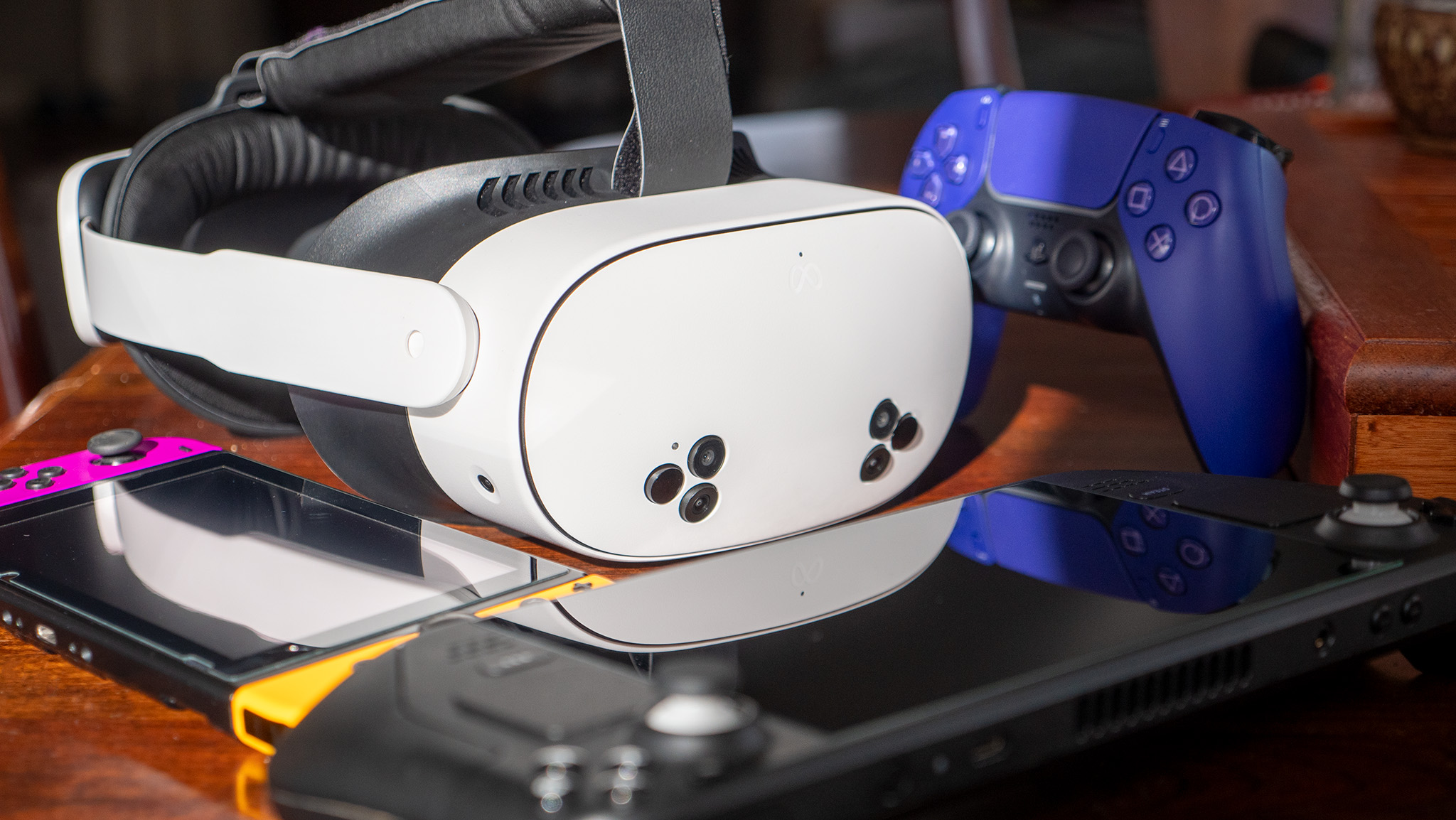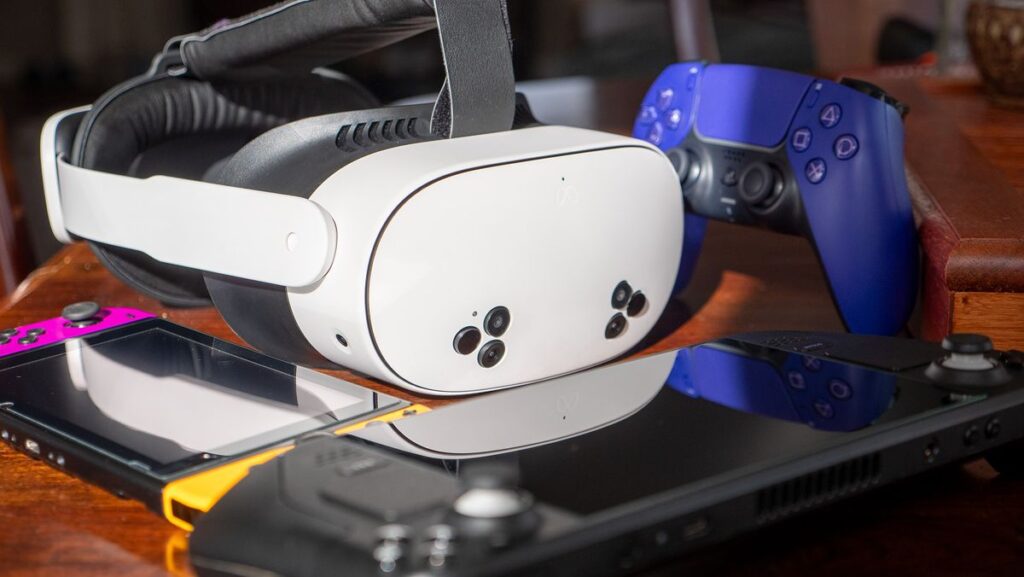
I’ve been a VR gamer for a solid decade now and can confidently say that 2024 was VR’s best year ever in some ways but the worst year in others. We got massive new releases like Batman Arkham Shadow — the first Batman Arkham game in a decade — Skydance’s Behemoth, Metro Awakening, and a slew of other truly amazing games that now grace the best Meta Quest games list.
However, we also have less competition than ever, with Meta ruling the roost with 74% of the market share, according to Counterpoint Research. The two major alternative players, Pico and Sony, saw a substantial drop in market share this year, and Apple’s Vision Pro failed to make a splash because of its ridiculous price point.
Ironically enough, this was also the year that Meta announced it was opening up its OS and becoming the Android of XR, announcing that new headsets with Xbox, Asus ROG, and Lenovo branding would be coming in 2025. Essentially, that shows that the market continues to shift prominently to standalone headsets, while PC and console-attached VR headsets will almost certainly remain the minority for the foreseeable future.
Big names, big gains
When Batman Arkham Shadow’s announcement trailer debuted in May, it received plenty of harsh criticism from Arkham fans. But many people who took the time to try it were surprised by how good it was even despite not being developed by the original Arkham team.
Likewise, the reception to Metro Awakening and Skydance’s Behemoth has been incredibly solid, successfully pulling a new wave of VR gamers off the couch and into the experience. Previous AAA-grade titles have failed to garner this sort of reception, and it remains to be seen whether Meta and other developers will be able to keep these gamers satisfied in 2025.
Proven VR-only development studios were carefully chosen to translate each AAA IP’s unique game mechanics and atmosphere into VR and each game benefitted brilliantly from this choice.
Some of the upcoming Meta Quest games we know of in 2025 include the likes of Alien Rogue Incursion, the first official Alien-branded made-for-VR game, and it’s entirely likely we’ll continue to see more big-name titles make their way to VR platforms in 2025.
All of the big-name VR games released in 2024 have something in common, too: none of them were developed by the original developers of each respective IP. Instead, proven VR-only development studios were carefully chosen to translate each title’s unique game mechanics and atmosphere into VR, and each game benefitted brilliantly from this choice.
This is hugely promising for VR gamers as it means that larger publishers and development houses will likely repeat history, especially now that we’re seeing more hardware come to market from brands like Xbox and Asus ROG.
If Meta has proven anything, it’s that it’ll continue to remain the king of XR going forward. Meta had the most successful pair of smart glasses in 2024, Ray-Ban Meta Smart Glasses, and the launch of the budget-friendly Meta Quest 3S is proving to be a success if estimates from Black Friday weekend are anything to go by.
Pico never got a good foothold in the market because of U.S. trade relations with China. It is owned by Bytedance, the controversial parent company of TikTok, which made it impossible to officially sell in the country. Pico has done OK elsewhere in the world but still represents less than 10% of headset sales in the most recent quarter per Counterpoint Research’s data.
Likewise, Sony’s lack of substantial support for its PlayStation VR2 headset meant that sales continued to dwindle throughout the year. We don’t have numbers for how well the headset sold through Black Friday weekend but no news isn’t good news, in this case.
But not everything is a sad story.
Google is launching Android XR in 2025, but there’s seemingly no hardware ready for the fledgling new platform. Google says this is the first Android “built for the Gemini era,” complete with some impressive-looking new user interface concepts that could very well revolutionize how we interact with XR devices in the future. We’ll have to wait for an actual market-ready device first, though, which may likely come from Samsung with Project Moohan.
Google and Valve could potentially disrupt the VR market in huge ways in 2025, leading to some exciting possibilities.
Valve’s standalone VR headset — known currently as Valve Deckard — could disrupt the VR market in an important way, similar to how the company disrupted the portable console market with the Steam Deck two years ago.
Rumors for Deckard have been going around for what feels like years, and the latest leaks and rumors show that Valve is working on a new SteamOS-based product and new VR controllers. Steam is a fan-favorite content distribution network and is largely considered the most consumer-friendly digital marketplace on the planet.
With that kind of mindshare, Valve could make huge waves in the VR market if it finally debuts its long-awaited standalone hardware. Otherwise, considering the momentum Meta has built up along with its new hardware partners, it’s looking like a Meta headset is still the best place to play VR in 2025.
Not only that, but Meta’s lead in smart glasses and multimodal AI makes the company the most likely to continue to push the limit on what we are expecting from VR and even XR, as a whole. Google has a real chance of disrupting the market in 2025, but Meta is the most likely company to deliver on promises and expectations next year and beyond.
Meta needs to work on better curating the immense content it has instead of promoting Horizon Worlds so much.
Meta needs to work on better surfacing and curating the games that are available on its platform, as the indies that mostly power the platform’s content tend to get buried by Meta’s own Horizon Worlds Metaverse promotions. Much of the industry’s success and future is riding on Meta’s ability to manage the lead it currently has, but the company hasn’t always shown it makes the best decisions in the interest of the developers that support it.
However, the video game market’s slow decline in 2024 isn’t likely to let up in 2025 unless some important economic factors change. This means that sales across the board — whether we’re talking PS5 games or Meta Quest headsets — will likely be lower than in prior years.
Several developers closed their doors in 2024 because of this, and I don’t necessarily think that trend will change in 2025. I don’t think this will affect the number of big-name games Meta and others are sure to reveal throughout the year, but it might mean some of your favorite games could close up shop if player numbers don’t improve.
It’s a tough market out there, and while 2025 isn’t likely to improve much, it will also help players strengthen their business models and remain resilient through difficult periods in the future. Whoever is left standing at the end of 2025 will, no doubt, take in the lion’s share of the winnings going forward.


